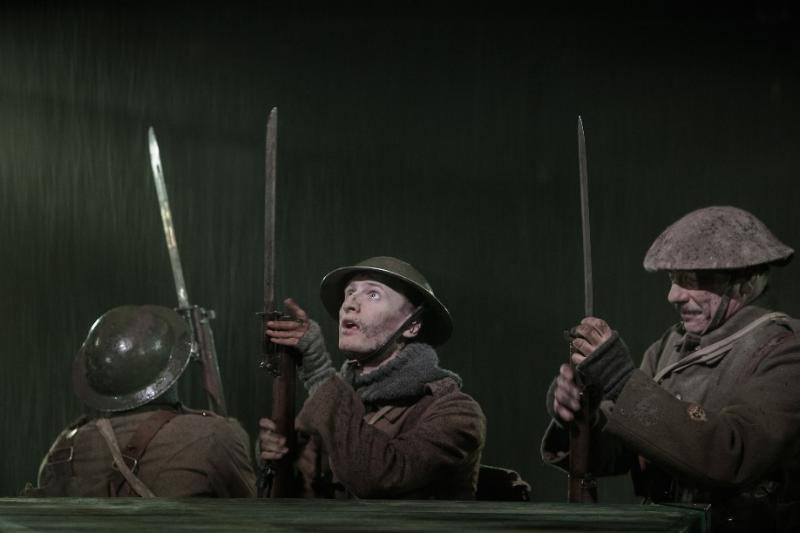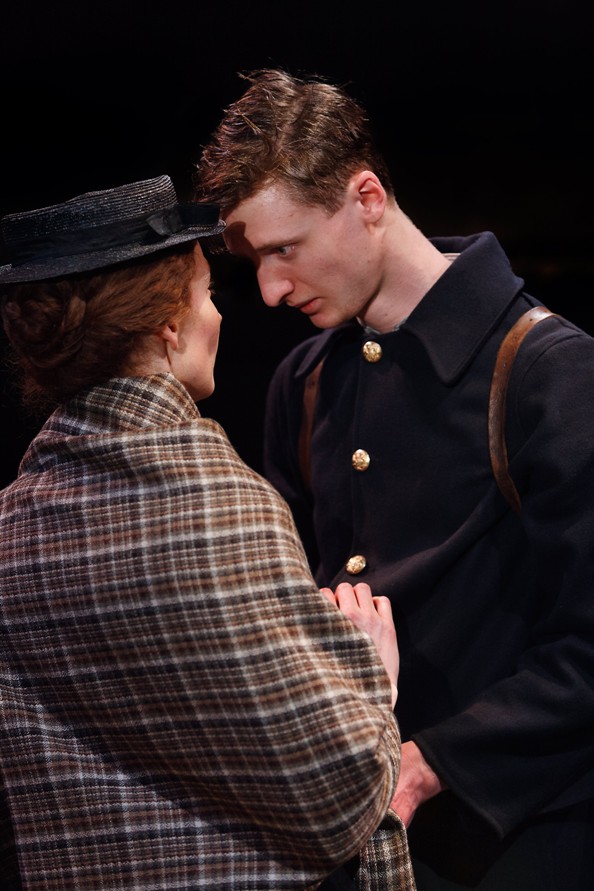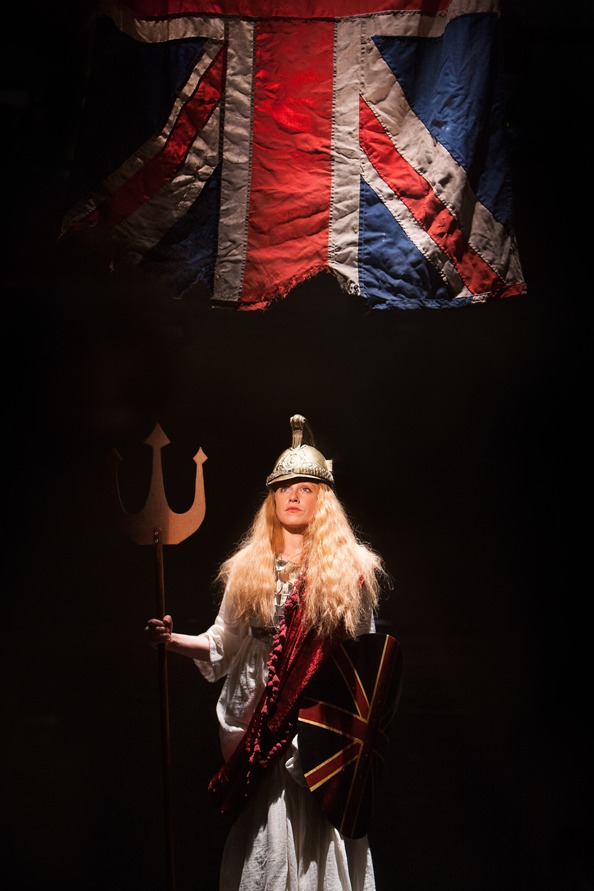The Accrington Pals, Royal Exchange, Manchester | reviews, news & interviews
The Accrington Pals, Royal Exchange, Manchester
The Accrington Pals, Royal Exchange, Manchester
The women who wait provide a moving viewpoint on First World War disaster

On 1 July 1916, the battalion of Lancashire volunteers recruited from Accrington was all but wiped out in about 20 minutes as they took on the task of attacking the village of Serre on the opening day of the Battle of the Somme. Out of 700 men, 235 were killed, 350 wounded, “mown down like meadow grass”. Such was the fate of the Accrington Pals, formally the 11th (Service) Battalion (Accrington) of the East Lancashire Regiment.
Accrington was the smallest town in Britain to raise a Pals battalion for Kitchener’s Army, so their pride and fate touched the whole community. Playwright Peter Whelan, whose Mancunian father was wounded at Passchendaele in 1917, looks at this heartbreaking story from the viewpoint of the women left behind. “It’s a very feminine play,” he says. Premiered by the RSC in London 30 years ago, it is the story of one small town, but has universal application. The writing is deeply felt, the effect deeply moving. And as director, James Dacre brings to it an insightful and sympathetic control, which keeps the emotions of loyalty, love and loss in tight focus.
 This is the workaday world of knockers-up, rain-soaked cobbled streets, neighbourliness and matriarchal rule. At the centre of it all is May, an independent no-nonsense woman in her late thirties, her emotions so suppressed that she misses out on her chance of love with her young cousin Tom, even denying him a farewell kiss (pictured right, Emma Lowndes as May and Robin Morrissey). She has a street fruit-and-veg stall to supply the mill girls on their way to work, but aspires to open a shop one day. Her kitchen is the gathering ground for the other women. We see them growing in confidence and taking over men’s jobs, like working on the trams. But it’s all nicely underplayed as they wait in suspense for what is to come. The dramatic irony is that their fate is in the hands of events beyond their control.
This is the workaday world of knockers-up, rain-soaked cobbled streets, neighbourliness and matriarchal rule. At the centre of it all is May, an independent no-nonsense woman in her late thirties, her emotions so suppressed that she misses out on her chance of love with her young cousin Tom, even denying him a farewell kiss (pictured right, Emma Lowndes as May and Robin Morrissey). She has a street fruit-and-veg stall to supply the mill girls on their way to work, but aspires to open a shop one day. Her kitchen is the gathering ground for the other women. We see them growing in confidence and taking over men’s jobs, like working on the trams. But it’s all nicely underplayed as they wait in suspense for what is to come. The dramatic irony is that their fate is in the hands of events beyond their control.
The women are gossipy and chirpy, with a keen sense of humour. Talking about their menfolk’s attributes, one says coarsely: “Bill’s like a steam hammer. If he missed me, he’d have the bedroom wall down.” Whelan is good on female banter – he heard a lot as a boy. So what we have essentially is a Lancashire domestic drama, punctuated with laddish militaria. It develops slowly. Intentionally, there is little marching or sense of warfare.
It is only when, late on in the play, that the news comes that the Pals are being sent to France, rather than just training in Caernarfon and popping home on leave, that reality dawns. And, even then, they are sure that our lads will win. There is just one brief “battle” scene, using a kitchen table and some chairs, demonstrating the Pals going over the top in foul weather. And this is touchingly juxtaposed with one of the girls, dressed as Britannia, breaking down as she sings Edward German’s “O. Peaceful England” at a charity do for the Pals (pictured below left). But unreliable news begins to filter back from the front and rumours are rife. Poignantly, a homing pigeon that one man had taken with him comes home half-dead. It’s a portent. The women fear the worst and march (off-stage)on the Town Hall to demand accurate information. All is lost, but May sets up her stall again for business as usual.
 There are splendid performances all round, especially from the five women. But Emma Lowndes makes of May a woman challenged by her own demons: fiercely independent, aspirational, emotionally stunted. As her young friend Eva, who certainly knows what love is, Sarah Ridgeway is an effective foil. Robin Morrissey as Tom catches the sense of an artistic lad unsuited for soldiering – “You don’t need qualification to get shot at,” says May – and Simon Armstrong is a suitably tough but paternalistic sergeant major.
There are splendid performances all round, especially from the five women. But Emma Lowndes makes of May a woman challenged by her own demons: fiercely independent, aspirational, emotionally stunted. As her young friend Eva, who certainly knows what love is, Sarah Ridgeway is an effective foil. Robin Morrissey as Tom catches the sense of an artistic lad unsuited for soldiering – “You don’t need qualification to get shot at,” says May – and Simon Armstrong is a suitably tough but paternalistic sergeant major.
What makes the play as a spectacle is the work of the technical team. Jonathan Fenson’s design, focused on a large cobbled square, which serves for all purposes, is very realistic, especially when the rain pours down, as it frequently does. Emma Laxton’s soundscape, from the haunting call of the Boys’ Brigade Band off-stage to ear-splitting gunfire, and Charles Balfour’s atmospheric lighting are terrific.
From the optimistic beginning of eagerness, loyalty, comradeship, pride, we are left with the crushing desolation wrought by war.
rating
Explore topics
Share this article
The future of Arts Journalism
You can stop theartsdesk.com closing!
We urgently need financing to survive. Our fundraising drive has thus far raised £49,000 but we need to reach £100,000 or we will be forced to close. Please contribute here: https://gofund.me/c3f6033d
And if you can forward this information to anyone who might assist, we’d be grateful.

Subscribe to theartsdesk.com
Thank you for continuing to read our work on theartsdesk.com. For unlimited access to every article in its entirety, including our archive of more than 15,000 pieces, we're asking for £5 per month or £40 per year. We feel it's a very good deal, and hope you do too.
To take a subscription now simply click here.
And if you're looking for that extra gift for a friend or family member, why not treat them to a theartsdesk.com gift subscription?
more Theatre
 Interview, Riverside Studios review - old media vs new in sparky scrap between generations
Robert Sean Leonard and Paten Hughes make worthy sparring partners
Interview, Riverside Studios review - old media vs new in sparky scrap between generations
Robert Sean Leonard and Paten Hughes make worthy sparring partners
 Fat Ham, RSC, Stratford review - it's Hamlet Jim, but not as we know it
An entertaining, positive and contemporary blast!
Fat Ham, RSC, Stratford review - it's Hamlet Jim, but not as we know it
An entertaining, positive and contemporary blast!
 Juniper Blood, Donmar Warehouse review - where ideas and ideals rule the roost
Mike Bartlett’s new state-of-the-agricultural-nation play is beautifully performed
Juniper Blood, Donmar Warehouse review - where ideas and ideals rule the roost
Mike Bartlett’s new state-of-the-agricultural-nation play is beautifully performed
 The Gathered Leaves, Park Theatre review - dated script lifted by nuanced characterisation
The actors skilfully evoke the claustrophobia of family members trying to fake togetherness
The Gathered Leaves, Park Theatre review - dated script lifted by nuanced characterisation
The actors skilfully evoke the claustrophobia of family members trying to fake togetherness
 As You Like It: A Radical Retelling, Edinburgh International Festival 2025 review - breathtakingly audacious, deeply shocking
A cunning ruse leaves audiences facing their own privilege and complicity in Cliff Cardinal's bold theatrical creation
As You Like It: A Radical Retelling, Edinburgh International Festival 2025 review - breathtakingly audacious, deeply shocking
A cunning ruse leaves audiences facing their own privilege and complicity in Cliff Cardinal's bold theatrical creation
 Edinburgh Fringe 2025 reviews: Refuse / Terry's / Sugar
A Ukrainian bin man, an unseen used car dealer and every daddy's dream twink in three contrasting Fringe shows
Edinburgh Fringe 2025 reviews: Refuse / Terry's / Sugar
A Ukrainian bin man, an unseen used car dealer and every daddy's dream twink in three contrasting Fringe shows
 Faustus in Africa!, Edinburgh International Festival 2025 review - deeply flawed
Bringing the Faust legend to comment on colonialism produces bewildering results
Faustus in Africa!, Edinburgh International Festival 2025 review - deeply flawed
Bringing the Faust legend to comment on colonialism produces bewildering results
 Edinburgh Fringe 2025 reviews: Imprints / Courier
A slippery show about memory and a rug-pulling Deliveroo comedy in the latest from the Edinburgh Fringe
Edinburgh Fringe 2025 reviews: Imprints / Courier
A slippery show about memory and a rug-pulling Deliveroo comedy in the latest from the Edinburgh Fringe
 Edinburgh Fringe 2025 reviews: The Ode Islands / Delusions and Grandeur / Shame Show
Experimental digital performance art, classical insights and gay shame in three strong Fringe shows
Edinburgh Fringe 2025 reviews: The Ode Islands / Delusions and Grandeur / Shame Show
Experimental digital performance art, classical insights and gay shame in three strong Fringe shows
 Edinburgh Fringe 2025 reviews: Ordinary Decent Criminal / Insiders
Two dramas on prison life offer contrasting perspectives but a similar sense of compassion
Edinburgh Fringe 2025 reviews: Ordinary Decent Criminal / Insiders
Two dramas on prison life offer contrasting perspectives but a similar sense of compassion
 Edinburgh Fringe 2025 reviews: Kinder / Shunga Alert / Clean Your Plate!
From drag to Japanese erotica via a French cookery show, three of the Fringe's more unusual offerings
Edinburgh Fringe 2025 reviews: Kinder / Shunga Alert / Clean Your Plate!
From drag to Japanese erotica via a French cookery show, three of the Fringe's more unusual offerings
 The Two Gentlemen of Verona, RSC, Stratford review - not quite the intended gateway drug to Shakespeare
Shakespeare trying out lots of ideas that were to bear fruit in the future
The Two Gentlemen of Verona, RSC, Stratford review - not quite the intended gateway drug to Shakespeare
Shakespeare trying out lots of ideas that were to bear fruit in the future

Add comment